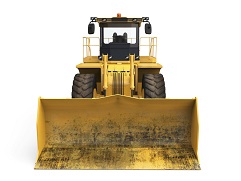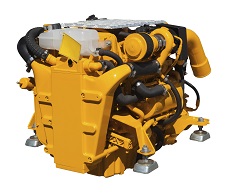 According to Wells Fargo’s 2014 Construction Industry Forecast, contractors across the country still see “economic uncertainty” as the greatest risk to your industry – but they’re also three times more optimistic now than they were in 2009. With good reason: housing starts are way up, especially multi-family projects, and the American Road & Transportation Builders Association expects to see a five percent increase in infrastructure construction this year.
According to Wells Fargo’s 2014 Construction Industry Forecast, contractors across the country still see “economic uncertainty” as the greatest risk to your industry – but they’re also three times more optimistic now than they were in 2009. With good reason: housing starts are way up, especially multi-family projects, and the American Road & Transportation Builders Association expects to see a five percent increase in infrastructure construction this year.
Since you’re one of the few and proud still in business since 2009 you’ve certainly witnessed an up tick in the number of contracts out to bid, and without a doubt you’re landing your share. You win them because you focus on service and quality, as always, but emerging from this particular lean period has its own set of unique business risks that could sap your profitability:
1. Fuel
Manufacturers rolling out fuel-efficient Tier 4 equipment know you want it, especially if you haven’t bought anything in a while, but you may be too conservative to make a major capital outlay just yet. That means your fleet still consumes a lot of fuel, which is fine – so long as that expenditure of energy and money contributes productive work to a project.
Often it doesn’t. In fact, according to a study that Komatsu started in 2006, fully 40% of the time your equipment’s engine is running it is idling and doing nothing. Nothing, that is, except wearing out, shortening your warranty, reducing your re-sale value and wasting money. This negatively impacted margin back in 2009 when diesel cost $2.40 a gallon. Today, at $3.90 a gallon, it becomes a risk to your profitability across the board.
Industry experts say that the simplest solution produces the best results: change your crew’s culture so they shut down idle equipment and allow time to re-start when it is needed.
2. Out-of-State Lawsuits
 The government never tires of coming up with new ways to get in your way and this year’s innovation is the J-Crew case, which began in Texas and ended up in the Supreme Court. It has small- and mid-sized contractors fuming nationwide since the court sided with corporate general contractors over independent ones.
The government never tires of coming up with new ways to get in your way and this year’s innovation is the J-Crew case, which began in Texas and ended up in the Supreme Court. It has small- and mid-sized contractors fuming nationwide since the court sided with corporate general contractors over independent ones.
When a general contractor sub-contracts a smaller one, they often include a “forum selection” clause that requires any disputes to be settled in the courts of a particular state – regardless of where the project is being done or where the sub-contractor is located. Since there’s such an obvious disparity in power between the two parties, several states illegalized those clauses so a sub-contractor could use his local court system if a grievance arose, no matter what the contract said.
The Supreme Court decided that the contract takes precedence over the state’s law. With that decision industry analysts believe that many sub-contractors are left with only one solution: to raise their prices. One industry analyst expressed the wider frustration, asking, “Does anyone who isn't a general contractor think such ‘forum selection’ clauses are a good idea? Smart subcontractors will anticipate the high costs of potential claims and put them in their prices” when they can’t get the clause removed through negotiation.
3. Inexperienced New Hires
Along with the rebound come new employees – and the safety risks inherent in putting them in a dangerous construction zone full of heavy equipment. Three out of five workers injured on-site do not speak English as their first language, which may indicate that they didn’t understand the safety training they were given. And relying upon experienced crew members to look after the new ones may be a catastrophic miscalculation.
Accidents not only demoralize you, your crew and your client, they also often cause lengthy inspections or even impoundment by law enforcement. Don’t let this risk mar what should be a year full of optimism – train your crew methodically and repeatedly.
4. Unexpected Maintenance
 The entire telemetric industry arose to address this risk, and eventually it probably will, although at present 40% of heavy equipment managers don’t think there’s a business case for it and another 36% think that current systems don’t work.
The entire telemetric industry arose to address this risk, and eventually it probably will, although at present 40% of heavy equipment managers don’t think there’s a business case for it and another 36% think that current systems don’t work.
But the vision of sensors on heavy equipment giving real-time wear and performance data so that managers can schedule preventative maintenance and eliminate catastrophic failure continues to attract passionate advocates. It’s such a compelling vision that inventors have flooded the market with a variety of solutions – each of which collects different data, records it differently, and cannot communicate with any other system. The lack of standards and interoperability has slowed down adoption, leaving most managers to rely on tried and true inspections by seasoned, human professionals.
Regardless of the method you’ve implemented, you have a much better chance of completing existing jobs and obtaining new ones if you continuously monitor and inspect your machines.
5. Missed Opportunities
As you try to match your fleet to your evolving business your balancing act has probably never been more complex. Advances in technology and seismic shifts in the heavy equipment market make it difficult to know how you should manage your assets to best serve your business goals.
Should you rent or buy used? Should you sell through an international online broker or look for an in-state buyer? Should you finance a new Tier 4 machine?
Cost analysis isn’t enough, since shifts in regulations may dramatically affect depreciation and resale value. And it’s not enough because the equipment you own reflects directly upon who you are as a businessperson, which may impact what prospects think of you and what opportunities come your way.
There’s no universal guideline for balancing all of that, but there is a universal guideline for closing business: be there for your client. As you know, most business to business transactions are paid by check. And as you probably also know, check verification services differ from each other as much as your competitors differ from you.
Be sure you work with a provider that provides top quality so you never decline a check that’s good. Choose one that guarantees their verifications so you know you’ll get paid no matter what. While you’re at it, you may as well insist upon one that offers a multiple check option so you can let your client write two to four checks dated over the course of the next thirty days – even while you still get the guarantee on all those checks.
There are more bids out there now than there have been in years. Don’t miss even one! Learn how here.



